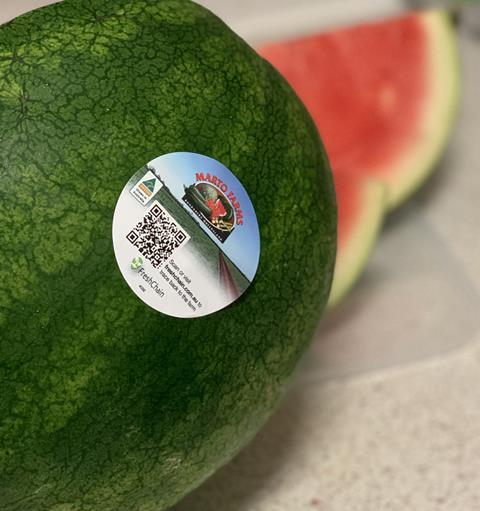
One of Queensland’s largest seedless watermelon growers, Marto Farms, has unveiled a new way for Australian consumers to track and trace the fruit they consume.
In an Australian first, the blockchain end-to-end consumer traceability and marketing system, developed by FreshChain, aims to educate consumers on the origin of the fruit, as well as introduce them to the producer that grew it.
Director at Marto Farms, Andrew Martens, spoke of how consumer engagement has developed over time: “The world has changed, and people simply want to know more about their food, it’s location and those who produce it,” said Martens.
“Consumers can now simply scan a QR code on our seedless melons label to see detailed information on the harvest, conditions, certifications and handy hints relating to that specific melon.
“This represents a great opportunity to showcase our world class products, passions and farming practises. Inviting consumers to learn more about the product they are buying will only enhance our offer and create long lasting connection and loyalty in both local and export markets,” he added.
Greg Calvert, founding director at FreshChain, said consumers have responded strongly to the technology: “The response so far for watermelons has been very encouraging. Whether from the wholesale markets or retail stores we have had significant follow-up from consumers and customers wanting more detail on who is stocking these melons and availability,” said Calvert.
“People want more detail and to be assured the food is authentic and safe but not be overwhelmed with data. We continue to achieve a significant number of QR scans and are receiving great feedback, including on storage tips for fresh food which is a major contributor to food waste.”
Produce traceability is an important asset to consumers across Asia, and Calvert believes that it’s growing in interest in Australia.
“There is no question that the desire to understand more about your food and those who produce it is on the increase,” explained Calvert.
“Talking to hundreds of growers and thousands of consumers, they all talk about building trust by being more open and prepared to share which in turn builds loyalty and value.
“Beyond just consumers, our entire fresh food eco system seems to be heavily vested in ensuring we protect Australia's wider reputation as a global provider of safe and fresh food,” he added.
Calvert outlined how this technology works harmoniously with our digitally driven lives.
“Most people I know have a smartphone and many people now review online before they buy and importantly, will walk if not satisfied or feel they are being duped,” he said.
“One of the beauties (and there are downsides) of our overall constant connectedness is the ability to very quickly reach an audience of those who have a deep interest in this space and prepared to make buying decisions around it.
“For retailers, their heartland battle has always been to lead in the fresh food offer and so those who are prepared to be more open, transparent and invest in the education for consumers will gain the trust and loyalty of our next generation of people who have money to spend,” Calvert explained.
Andrew Martens spoke of the importance of maintaining a healthy and open relationship with consumers.
“We simply can't risk losing the trust of the next generation of consumers who have money to spend by not being more open. We should all be involved in initiatives to secure the fresh food future of Australia,” said Martens.
Although currently applied to watermelons, FreshChain is working with other producers to coincide with different seasons, including other melons, berries, stonefruit, bananas, mangoes, leafy greens and tomatoes.



